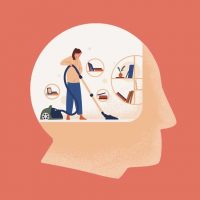Five ways to lose the digital fat and achieve better thinking
David Ryan Polgar
Many countries around the world are facing a growing obesity problem. Food has gone from a scarce and finite resource to being plentiful and seemingly unlimited. The dramatic increase in available food, and our consumption of it, has correlated with our growing waistlines. A less discussed issue is the effect that the rise in our information consumption from technology is having on our minds. It is evident that many of us are becoming physically obese. Are we also becoming mentally obese?
The Brick House analogy
Imagine that each one of us is building a “house” of wisdom. We build our house with bricks, each brick being a piece of information. After we have gathered an ample amount of bricks we go about reinforcing the bricks into the structure. The process of securing the bricks into the structure represents knowledge. Over the years, with enough time spent on the particular task of building, you have constructed a house. This house, which can be expanding over time by collecting more bricks and reinforcing them to the structure, is wisdom.
Throughout history bricks have been in limited supply. A person would build as large a house as they could with the combination of bricks available to them and the time they were able to spend building. The predicament we face in our modern day is that we now have an endless supply of bricks that we can collect. This oversupply of bricks often prevents us from moving on to the building stage because our brains are hardwired to collect as many bricks as possible.
The internet, and the endless information it supplies, has created a major building block. If we are trained to collect bricks and there is an unlimited amount of them, when do we stop collecting and start building the house?
The importance of quality thinking
The ability to have quality thinking is essential to our very existence. As the Buddha observed, “We are what we think.
All that we are arises with our thoughts. With our thoughts, we make the world.” Unfortunately, thinking in the 21st century is often impeded by the intrusion of digital distractions and information overload. Although technology is not inherently negative, its overuse can certainly have negative consequences for our ability to move behind a superficial level of thinking and move towards a deeper, more meaningful, level.
Many spiritual teachings rely on the act or process of reflection. Reflection, in turn, relies on a certain level of tranquility and peace of mind. One of the difficulties of modern day is finding that sense of calm in an age of distraction and information overload. Technology has moved from our desktops to our pockets, and that evolution has increased our likelihood to be saturated by information and unable to adequately reflect. We need to reflect in order to turn information into knowledge and then into wisdom.

The digital diet
While many remedies to this problem rely on avoidance of technology, or moderation through sheer will power, I advocate a paradigm shift in how we view information. If we treat information as food, the solution to the problem becomes far easier to grasp. It moves from an ethereal dilemma to a process we can conceptualize. By visualizing information as food we can find the similarities between physical obesity and mental obesity. With a similarity in the struggle comes a similarity in the solution. The solution for physical obesity is typically to eat less food, eat healthier food, allow for digestion, and exercise. Also, to determine how healthy your body is, you occasionally do an assessment of your body’s health. I advocate following a similar model to reduce your digital fat and achieve better thinking.
1. Take an assessment of your digital weight
It is relatively easy to take an assessment of your physical body. You can weigh yourself on a scale, look in the mirror, or notice that your pants are tighter. You may also intuitively feel that your body is not as healthy as it could be. It is more difficult to assess your thinking. However, many of us sense that our thoughts are not as clear as we would like them. Take an assessment. Could your thoughts be clearer? If so, what do you think is getting in the way?
When you assess your physical weight you typically find a reason or two for your weight gain and then you craft a plan of action. Perhaps you were eating the wrong types of food, too much food, or not getting enough exercise. In a similar manner, assess your current level of thinking. If it is not as clear as you would like, consider where and when you have had your best thinking. What was different about your environment at that time? Most likely, your best thinking stemmed from the ability to remove various digital distractions. Once you understand your ideal environment for thinking, you are better able to understand what is currently getting in your way.
2. Consume less information
One of the easiest ways to lose your physical weight is to consume less food. Consuming less food is not as easy as it sounds because you are tempted to consume what is in front of you. If there is food on the table, you are more likely to eat it. Although a large amount of what we consume is based on will power, you can assist your will power by removing the very temptation of food.

Likewise, you can consume less information by removing the potential for digital distraction. The ability to consume information has gone from something people had to seek out (reading a book) to something people are constantly bombarded with. Given that information is so easy to consume, and that we generally like to consume information, you need to take an active role in judging when your mind is overloaded. You know when your stomach is full but how do you know when your brain is full?
3. Consume better information
You are what you eat. Information is food, and not all foods are created equal. There is a major difference in reading a thought-provoking book versus celebrity gossip.
Unfortunately, people have a tendency to be drawn towards fatty foods and fatty information. Fat tastes pleasant on the tongue in the same way that certain forms of information consumption may feel good to your brain. Like fatty foods, most consumption is fine in moderation. The goal is to move your information consumption towards sources that challenge and awaken your brain, as opposed to being mindless and numbing.
Think about the different types of information you consume. What types make your brain feel alive versus dull? Many people who are on a physical diet keep a journal of their food consumption to really understand what food they are putting in their body. Start keeping a mental note of the information you consume. By doing this you are better able to pinpoint areas of information overload that you are then able to cut out.
4. Allow for digital digestion
In order for your information to turn into knowledge, you must allow for digital digestion. The digital digestion process can be done through reflection. Confucius noted that reflection was the noblest way to achieve wisdom. By reflecting on the information we consume we are able to allow it to move to a deeper level. The act of reflecting also prevents us from continuing to consume information. The dilemma in modern day is typically too much information and not enough digestion.
One of the best ways to allow for digital digestion is practicing the art of patience. The speed of the internet and other technological advances has dramatically increased the velocity of our existence. Quality thoughts, however, are more likely to derive from contemplation. We can improve our patience by doing activities where we purposely have to slow down.
5. Get more mental exercise
Your body needs a certain amount of exercise to maintain its ideal level of health. Likewise, you need to actively engage in mental exercise. One of the best ways to exercise your brain is to think of questions without an answer. To truly let your mind wander is freeing. It also expands your horizons and allows you to see solutions that may have been hidden before or to draw original conclusions.
I like to think of my mind as a balloon on a string that is attached to my hand. You can exercise your brain by letting out more and more string, allowing the balloon to be blown around in unexpected ways by the wind. The more that you can train your brain to be in a constant mode of discovery, the more you will want to let go of the string. Give your balloon the freedom to travel as it sees fit and you will be pleasantly surprised by where it travels.
Achieve better thinking
Following these five simple steps is a good way to achieve better thinking. By understanding that information affects our mind as food affects our body, we are better able to grasp how we can maintain a healthy brain and prevent mental obesity. We are able to finally stop collecting bricks and start building our house.
 David Ryan Polgar a is writer, educator, and attorney. He recently released “Wisdom in the Age of Twitter,” which details his own personal struggles with trying to achieve a level of quality thinking in an age of digital distraction and information over load. www.DavidRyanPolgar.com
David Ryan Polgar a is writer, educator, and attorney. He recently released “Wisdom in the Age of Twitter,” which details his own personal struggles with trying to achieve a level of quality thinking in an age of digital distraction and information over load. www.DavidRyanPolgar.com







